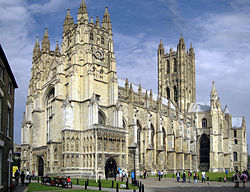This article needs to be updated.(July 2017) |
| Part of a series on |
| Anglicanism |
|---|
 |
| |
In Anglican Christianity, the term low church refers to those who give little emphasis to ritual, often having an emphasis on preaching, individual salvation, and personal conversion. [1] [2] The term is most often used in a liturgical sense, denoting a Protestant emphasis, whereas high church denotes an emphasis on ritual, often Anglo-Catholic (with respect to Anglicanism) and Evangelical Catholic (with respect to Lutheranism).
Contents
- Historical use
- Modern use
- Ecumenical relationships
- United churches with other Protestants in Asia
- Great Britain and Ireland
- See also
- References
- Further reading
- External links
The term was initially pejorative. During the series of doctrinal and ecclesiastic challenges to the established church in the 17th century, commentators and others – who favoured the theology, worship, and hierarchical structure of Anglicanism (such as the episcopate) as the true form of Christianity – began referring to that outlook (and the related practices) as high church , [3] and by the early 18th century those theologians and politicians who sought more reform in the English church and a greater liberalisation of church structure were in contrast called low church.
To an outsider, the difference between high church and low church may not be immediately obvious. There is a strong tradition of spiritual flexibility in Anglicanism, and many churches do not wish to exclude those who prefer one or the other. Most local churches do not identify as one or the other, and may try to accommodate many forms of worship. Churches that are more lax in ritual generally do not advertise as such, and the vast majority of Anglican churches, including most low church congregations, follow some kind of fixed liturgy. Low-church congregations, however, typically have plainer-looking churches, prefer modern language, have some aspects of contemporary worship, and include more roles for laypersons during service. One definite indicator of a low-church parish is infrequent services for performing sacraments such as the Eucharist. Many low-church parishes are strongly influenced by evangelicalism and individual religious experience, resulting in a tradition called Evangelical Anglicanism.

